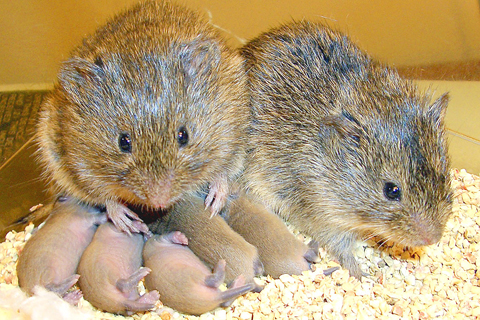Prairie voles, the furry rodents found in tall-grass fields in the US Midwest, may help scientists unlock age-old mysteries underlying human desire for companionship, sex and even the accumulation of wealth.
Research on the animal’s genetic makeup is uncovering more about human behavior than does the study of just about any other species, said Larry Young, a social-neurobiology researcher at Emory University in Atlanta. Voles have become the focus of scientists because they mate monogamously, unlike rats and monkeys. Voles also produce oxytocin, a hormone that spurs mothers to bond with babies, and dopamine, which fuels human cravings and euphoria.
Within months, Young and his colleagues will begin mapping the prairie vole’s genome after getting the animal approved for sequencing by the National Human Genome Research Institute in Bethesda, Maryland. The findings will advance understanding of the relationships between genes, the brain and behavior, and may lead to new therapies for autism and other social disorders, said Young, who has studied voles for 15 years.

PHOTO: BLOOMBERG
“Dopamine is involved in all kinds of rewards, things that make us feel good: eating, drinking, winning a football game, making money, buying a new car,” Young said.
Oxytocin is that reward of being around friends or a mate. There are times when you have the combination of the two — like when you are making love.
Oxytocin in the form of pitocin is frequently given to mothers during or after childbirth to speed delivery and reduce hemorrhaging, and is being used experimentally to treat autism, said Sue Carter, a biologist and co-director of the Brain Body Center at the University of Illinois at Chicago, who has studied voles for three decades.
Companies are trying to capitalize on oxytocin’s role in bonding and trust. Vero Labs LLC in Boca Raton, Florida, sells an oxytocin spray it calls Liquid Trust, and Genesis Biolabs Inc in Tucson, Arizona, markets a bonding test kit for humans that looks for the AVPR1a receptor gene that is also involved in prairie vole social behavior.
Like voles, some people have a genetic tendency to be more social and introduce their friends to each other, while others tend to keep to themselves, said Nicholas Christakis, co-author of Connected, which explains why behaviors are contagious and why the rich keep getting richer.
A similar group of genes influences pro-social behavior in prairie voles and us, said Christakis, who also teaches health-care policy, sociology and medicine at Harvard Medical School in Boston. There are advantages to these social networks. If you want to hunt a mastodon, it’s better to have your friends along.
The first time prairie voles mate, the chemistry of their brains is altered and they form a lasting bond with each other, even after they stop producing offspring, Young said. Some related species, such as meadow voles, aren’t monogamous, he said.
This flip-flopping of the neurochemistry in the brain prevents them from forming that kind of bond again, said Young, who organized a gathering of vole researchers in February that drew 90 attendees to Emory.

Indonesia yesterday began enforcing its newly ratified penal code, replacing a Dutch-era criminal law that had governed the country for more than 80 years and marking a major shift in its legal landscape. Since proclaiming independence in 1945, the Southeast Asian country had continued to operate under a colonial framework widely criticized as outdated and misaligned with Indonesia’s social values. Efforts to revise the code stalled for decades as lawmakers debated how to balance human rights, religious norms and local traditions in the world’s most populous Muslim-majority nation. The 345-page Indonesian Penal Code, known as the KUHP, was passed in 2022. It

‘DISRESPECTFUL’: Katie Miller, the wife of Trump’s most influential adviser, drew ire by posting an image of Greenland in the colors of the US flag, captioning it ‘SOON’ US President Donald Trump on Sunday doubled down on his claim that Greenland should become part of the US, despite calls by the Danish prime minister to stop “threatening” the territory. Washington’s military intervention in Venezuela has reignited fears for Greenland, which Trump has repeatedly said he wants to annex, given its strategic location in the arctic. While aboard Air Force One en route to Washington, Trump reiterated the goal. “We need Greenland from the standpoint of national security, and Denmark is not going to be able to do it,” he said in response to a reporter’s question. “We’ll worry about Greenland in

PERILOUS JOURNEY: Over just a matter of days last month, about 1,600 Afghans who were at risk of perishing due to the cold weather were rescued in the mountains Habibullah set off from his home in western Afghanistan determined to find work in Iran, only for the 15-year-old to freeze to death while walking across the mountainous frontier. “He was forced to go, to bring food for the family,” his mother, Mah Jan, said at her mud home in Ghunjan village. “We have no food to eat, we have no clothes to wear. The house in which I live has no electricity, no water. I have no proper window, nothing to burn for heating,” she added, clutching a photograph of her son. Habibullah was one of at least 18 migrants who died

Russia early yesterday bombarded Ukraine, killing two people in the Kyiv region, authorities said on the eve of a diplomatic summit in France. A nationwide siren was issued just after midnight, while Ukraine’s military said air defenses were operating in several places. In the capital, a private medical facility caught fire as a result of the Russian strikes, killing one person and wounding three others, the State Emergency Service of Kyiv said. It released images of rescuers removing people on stretchers from a gutted building. Another pre-dawn attack on the neighboring city of Fastiv killed one man in his 70s, Kyiv Governor Mykola